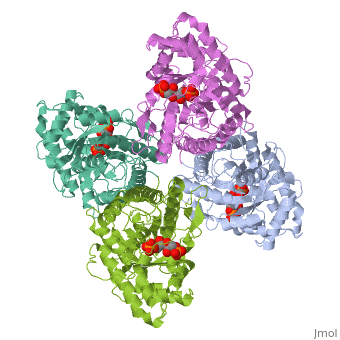4ald
From Proteopedia
| Line 2: | Line 2: | ||
===HUMAN MUSCLE FRUCTOSE 1,6-BISPHOSPHATE ALDOLASE COMPLEXED WITH FRUCTOSE 1,6-BISPHOSPHATE=== | ===HUMAN MUSCLE FRUCTOSE 1,6-BISPHOSPHATE ALDOLASE COMPLEXED WITH FRUCTOSE 1,6-BISPHOSPHATE=== | ||
{{ABSTRACT_PUBMED_10048322}} | {{ABSTRACT_PUBMED_10048322}} | ||
| + | |||
| + | ==Disease== | ||
| + | [[http://www.uniprot.org/uniprot/ALDOA_HUMAN ALDOA_HUMAN]] Defects in ALDOA are the cause of glycogen storage disease type 12 (GSD12) [MIM:[http://omim.org/entry/611881 611881]]; also known as red cell aldolase deficiency. A metabolic disorder associated with increased hepatic glycogen and hemolytic anemia. It may lead to myopathy with exercise intolerance and rhabdomyolysis.<ref>PMID:14766013</ref><ref>PMID:2825199</ref><ref>PMID:2229018</ref><ref>PMID:8598869</ref><ref>PMID:14615364</ref> | ||
| + | |||
| + | ==Function== | ||
| + | [[http://www.uniprot.org/uniprot/ALDOA_HUMAN ALDOA_HUMAN]] Plays a key role in glycolysis and gluconeogenesis. In addition, may also function as scaffolding protein (By similarity). | ||
==About this Structure== | ==About this Structure== | ||
| Line 11: | Line 17: | ||
==Reference== | ==Reference== | ||
| - | <ref group="xtra">PMID:010048322</ref><references group="xtra"/> | + | <ref group="xtra">PMID:010048322</ref><references group="xtra"/><references/> |
[[Category: Fructose-bisphosphate aldolase]] | [[Category: Fructose-bisphosphate aldolase]] | ||
[[Category: Homo sapiens]] | [[Category: Homo sapiens]] | ||
Revision as of 17:32, 24 March 2013
| |||||||||
| 4ald, resolution 2.80Å () | |||||||||
|---|---|---|---|---|---|---|---|---|---|
| Ligands: | |||||||||
| Activity: | Fructose-bisphosphate aldolase, with EC number 4.1.2.13 | ||||||||
| |||||||||
| |||||||||
| Resources: | FirstGlance, OCA, RCSB, PDBsum | ||||||||
| Coordinates: | save as pdb, mmCIF, xml | ||||||||
Contents |
HUMAN MUSCLE FRUCTOSE 1,6-BISPHOSPHATE ALDOLASE COMPLEXED WITH FRUCTOSE 1,6-BISPHOSPHATE
Template:ABSTRACT PUBMED 10048322
Disease
[ALDOA_HUMAN] Defects in ALDOA are the cause of glycogen storage disease type 12 (GSD12) [MIM:611881]; also known as red cell aldolase deficiency. A metabolic disorder associated with increased hepatic glycogen and hemolytic anemia. It may lead to myopathy with exercise intolerance and rhabdomyolysis.[1][2][3][4][5]
Function
[ALDOA_HUMAN] Plays a key role in glycolysis and gluconeogenesis. In addition, may also function as scaffolding protein (By similarity).
About this Structure
4ald is a 1 chain structure with sequence from Homo sapiens. The February 2004 RCSB PDB Molecule of the Month feature on The Glycolytic Enzymes by David S. Goodsell is 10.2210/rcsb_pdb/mom_2004_2. Full crystallographic information is available from OCA.
See Also
Reference
- Dalby A, Dauter Z, Littlechild JA. Crystal structure of human muscle aldolase complexed with fructose 1,6-bisphosphate: mechanistic implications. Protein Sci. 1999 Feb;8(2):291-7. PMID:10048322
- ↑ Esposito G, Vitagliano L, Costanzo P, Borrelli L, Barone R, Pavone L, Izzo P, Zagari A, Salvatore F. Human aldolase A natural mutants: relationship between flexibility of the C-terminal region and enzyme function. Biochem J. 2004 May 15;380(Pt 1):51-6. PMID:14766013 doi:10.1042/BJ20031941
- ↑ Kishi H, Mukai T, Hirono A, Fujii H, Miwa S, Hori K. Human aldolase A deficiency associated with a hemolytic anemia: thermolabile aldolase due to a single base mutation. Proc Natl Acad Sci U S A. 1987 Dec;84(23):8623-7. PMID:2825199
- ↑ Takasaki Y, Takahashi I, Mukai T, Hori K. Human aldolase A of a hemolytic anemia patient with Asp-128----Gly substitution: characteristics of an enzyme generated in E. coli transfected with the expression plasmid pHAAD128G. J Biochem. 1990 Aug;108(2):153-7. PMID:2229018
- ↑ Kreuder J, Borkhardt A, Repp R, Pekrun A, Gottsche B, Gottschalk U, Reichmann H, Schachenmayr W, Schlegel K, Lampert F. Brief report: inherited metabolic myopathy and hemolysis due to a mutation in aldolase A. N Engl J Med. 1996 Apr 25;334(17):1100-4. PMID:8598869 doi:http://dx.doi.org/10.1056/NEJM199604253341705
- ↑ Yao DC, Tolan DR, Murray MF, Harris DJ, Darras BT, Geva A, Neufeld EJ. Hemolytic anemia and severe rhabdomyolysis caused by compound heterozygous mutations of the gene for erythrocyte/muscle isozyme of aldolase, ALDOA(Arg303X/Cys338Tyr). Blood. 2004 Mar 15;103(6):2401-3. Epub 2003 Nov 13. PMID:14615364 doi:10.1182/blood-2003-09-3160


